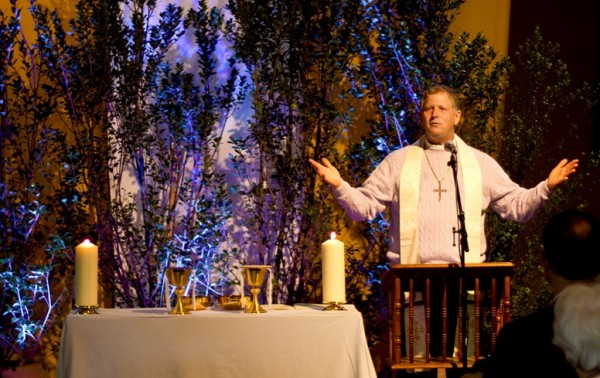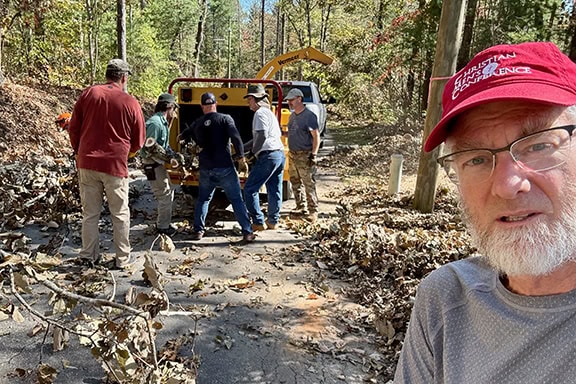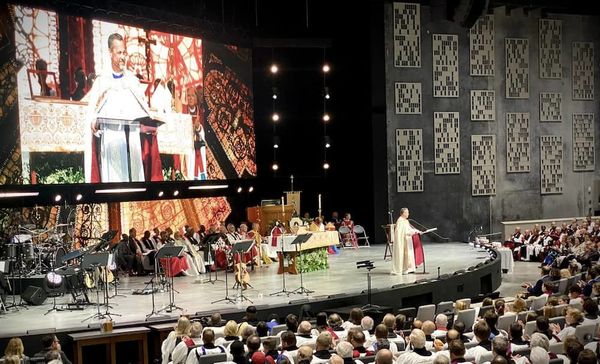This coming June, members and friends of the Anglican Church in North America will gather at Assembly 2012 in Ridgecrest, NC. A celebration of what the Lord is doing in and through us, Assembly 2012 will feature several guest speakers to encourage and impassion us in our callings, both as individuals and as a church.
Bishop Todd Hunter, a church planter, author and founding pastor of Holy Trinity Anglican Church in Costa Mesa, CA will speak about case studies in church planting and how it is a “strategic extension of God’s kingdom.” Bishop Hunter is the author of Christianity Beyond Belief , Giving Church A Second Chance , The Outsider Interviews, The Accidental Anglican and his latest book on temptation titled Our Favorite Sins. He is also the founding director of Churches for the Sake of Others, the West Coast church planting initiative for The Anglican Mission in the Americas. Bishop Hunter also founded Three is Enough, a small group movement that enables spiritual formation in one’s everyday life.
Anticipating Bishop’s Hunter’s discussion with us at Assembly 2012, the Anglican Church in North America conducted a Q&A session with him. Here’s what he had to say:
Q: In your view, what is the best way to get involved in the mission of reaching the “unchurched?”
Planting new churches. New churches attract unchurched people the best because there is not a preexisting social circle. I believe that is one of the things what the unchurched fear the most. With the death of Christendom and the advent of the post-modern mindset, evangelism has to be to be rooted in conversation – in what I call the “persuasive power of listening.” In this world of pluralism and relativism, evangelism is more about exchanging stories. In other words, relationship building, listening, and swapping stories need to happen first before “apologetics” can have their natural force.
Q: In your experience, what are some new tools or techniques being used to spread the Gospel? Do you think they are effective tools for that purpose?
The Alpha Course isn’t new but is the best programmatic approach to the listening and sharing stories aspect of evangelism. One of the easiest ways for folks to be involved in the Gospel today is to be involved in social justice projects such as Invisible Children, Habitat for Humanity, etc. Most kids today are vaguely spiritual and so the easiest way to get in touch with them is to get them involved with doing something good for others.
In a church planting point of view, there is a “missional-monastic” movement happening that gets traction with young Christian leaders. For example, a group of 20 and 30 year olds will move into a neighborhood in, say, Columbus, OH and have a highly focused goal of transforming their immediate surrounding community. They set their highest priority as being agents of the kingdom of God in a relational way and it’s working.
Q: What message do you hope to share with members and friends of the Anglican Church in North America at the upcoming 2012 Provincial Assembly?
Church planting, though it’s hard, and we have to find money and leaders, is doable and it’s happening. Church planting is very strategic to the extension of the kingdom of God. It is easy for people to get frustrated and discouraged about the task of church planting, so I will bring case studies and anecdotes that bring hope and confidence.
Q: What is your current ministry focus?
“Churches for the Sake of Others” is the church planting mission that I lead, and has a goal of starting 200 mission-minded, Spirit-filled, orthodox, Anglican churches in the west coast of America. We have 20 or so off the ground and running. I’ve started a church in Costa Mesa, CA called Holy Trinity which is growing nicely and is birthing two daughter churches.
Q: How can the Anglican Church in North America continue to pray for your ministries?
Pray that we would continue to find the right sort of leaders who have genuine, divine, callings to start churches in the west. Also, that these potential leaders wouldn’t be turned off by current political climate in Anglicanism.
Q: Tell us about your latest book Our Favorite Sins: The Essential Guide for Beating Temptation. What inspired you to write about this topic? What has the response been from readers?
My last two books have been more about my journey into Anglicanism and how I see using Anglican spirituality as a way of doing evangelism and discipleship. The book Our Favorite Sins is more written for Americans and not just “church/liturgical people.” It’s a way for me to talk about spiritual formation and get at a very human topic like temptation and to highlight Anglican spirituality in the way of Jesus.
Also, it is research based and so is statistically reliable in terms of temptations of Americans. The inspiration for Our Favorite Sins was to have a way to talk about spiritual formation that is practical and pointed at an issue everyone experiences. I show ancient practices that Christians have used to combat temptation, yet the ideas are targeted at anybody who has a sense of being spiritual.
Q: When you’re not writing and ministering, what are some of your favorite hobbies?
Reading and walking or bicycling around the Back Bay at Newport Beach, CA.
Q: Are you working on any projects, or books, that we can be on the look-out for?
Yes, we are working on another research based book on the topic of forgiveness. Stay tuned!
Q: Last but not least, what has been the impact of Anglicanism in your life, or why is Anglicanism relevant today?
Everybody says they are spiritual today, but not many people look to Church as a fountain from which to drink to quench their spiritual thirst. We must show them ancient wells and the connectivity that goes back to Celtic Christianity, and that there are ways that Christians have formed themselves in Christ.
Anglicanism gives a basic worldview on how to shape your life. The church calendar builds into your life this imagination for what God is doing. The prayers of confession keep you grounded. The creed gives you a way to profess what you believe in your own life. The rhythm in the routines of Anglican spirituality can lead people to Jesus who is the well from which we can drink and never thirst again. If people are plugged into this, Anglicanism can be very powerful today.
If you have not already done so, there is still time to register for Assembly 2012 and hear from Bp. Todd Hunter and our other guest speakers. Join us this summer as we are equipped and empowered to follow God’s call to spread the transforming love of Jesus Christ throughout North America!






